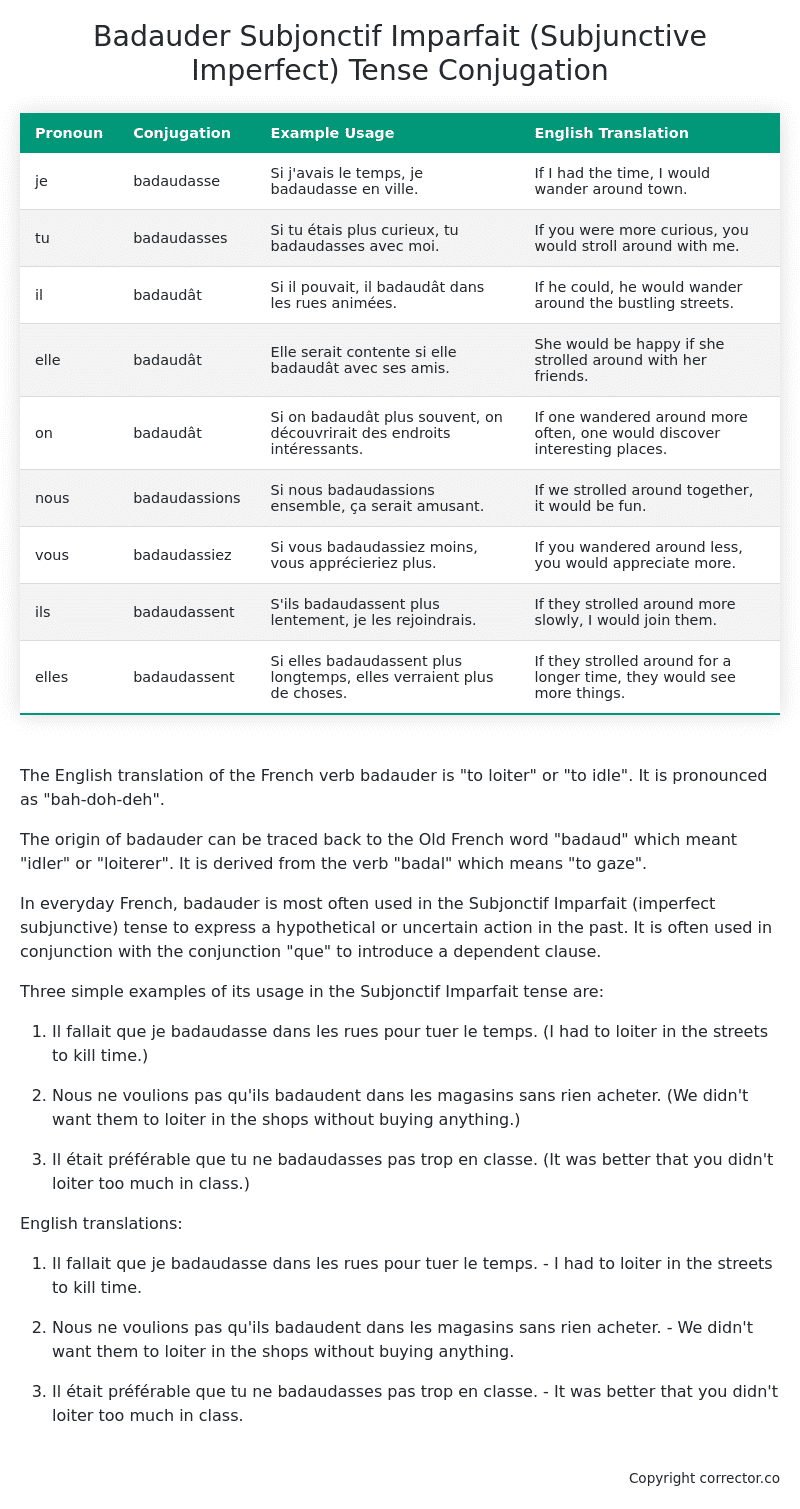Subjonctif Imparfait (Subjunctive Imperfect) Tense Conjugation of the French Verb badauder
Introduction to the verb badauder
The English translation of the French verb badauder is “to loiter” or “to idle”. It is pronounced as “bah-doh-deh”.
The origin of badauder can be traced back to the Old French word “badaud” which meant “idler” or “loiterer”. It is derived from the verb “badal” which means “to gaze”.
In everyday French, badauder is most often used in the Subjonctif Imparfait (imperfect subjunctive) tense to express a hypothetical or uncertain action in the past. It is often used in conjunction with the conjunction “que” to introduce a dependent clause.
Three simple examples of its usage in the Subjonctif Imparfait tense are:
-
Il fallait que je badaudasse dans les rues pour tuer le temps. (I had to loiter in the streets to kill time.)
-
Nous ne voulions pas qu’ils badaudent dans les magasins sans rien acheter. (We didn’t want them to loiter in the shops without buying anything.)
-
Il était préférable que tu ne badaudasses pas trop en classe. (It was better that you didn’t loiter too much in class.)
English translations:
-
Il fallait que je badaudasse dans les rues pour tuer le temps. – I had to loiter in the streets to kill time.
-
Nous ne voulions pas qu’ils badaudent dans les magasins sans rien acheter. – We didn’t want them to loiter in the shops without buying anything.
-
Il était préférable que tu ne badaudasses pas trop en classe. – It was better that you didn’t loiter too much in class.
Table of the Subjonctif Imparfait (Subjunctive Imperfect) Tense Conjugation of badauder
| Pronoun | Conjugation | Example Usage | English Translation |
|---|---|---|---|
| je | badaudasse | Si j’avais le temps, je badaudasse en ville. | If I had the time, I would wander around town. |
| tu | badaudasses | Si tu étais plus curieux, tu badaudasses avec moi. | If you were more curious, you would stroll around with me. |
| il | badaudât | Si il pouvait, il badaudât dans les rues animées. | If he could, he would wander around the bustling streets. |
| elle | badaudât | Elle serait contente si elle badaudât avec ses amis. | She would be happy if she strolled around with her friends. |
| on | badaudât | Si on badaudât plus souvent, on découvrirait des endroits intéressants. | If one wandered around more often, one would discover interesting places. |
| nous | badaudassions | Si nous badaudassions ensemble, ça serait amusant. | If we strolled around together, it would be fun. |
| vous | badaudassiez | Si vous badaudassiez moins, vous apprécieriez plus. | If you wandered around less, you would appreciate more. |
| ils | badaudassent | S’ils badaudassent plus lentement, je les rejoindrais. | If they strolled around more slowly, I would join them. |
| elles | badaudassent | Si elles badaudassent plus longtemps, elles verraient plus de choses. | If they strolled around for a longer time, they would see more things. |
Other Conjugations for Badauder.
Le Present (Present Tense) Conjugation of the French Verb badauder
Imparfait (Imperfect) Tense Conjugation of the French Verb badauder
Passé Simple (Simple Past) Tense Conjugation of the French Verb badauder
Passé Composé (Present Perfect) Tense Conjugation of the French Verb badauder
Futur Simple (Simple Future) Tense Conjugation of the French Verb badauder
Futur Proche (Near Future) Tense Conjugation of the French Verb badauder
Plus-que-parfait (Pluperfect) Tense Conjugation of the French Verb badauder
Passé Antérieur (Past Anterior) Tense Conjugation of the French Verb badauder
Futur Antérieur (Future Anterior) Tense Conjugation of the French Verb badauder
Subjonctif Présent (Subjunctive Present) Tense Conjugation of the French Verb badauder
Subjonctif Passé (Subjunctive Past) Tense Conjugation of the French Verb badauder
Subjonctif Imparfait (Subjunctive Imperfect) Tense Conjugation of the French Verb badauder (this article)
Subjonctif Plus-que-parfait (Subjunctive Pluperfect) Tense Conjugation of the French Verb badauder
Conditionnel Présent (Conditional Present) Tense Conjugation of the French Verb badauder
Conditionnel Passé (Conditional Past) Tense Conjugation of the French Verb badauder
L’impératif Présent (Imperative Present) Tense Conjugation of the French Verb badauder
L’infinitif Présent (Infinitive Present) Tense Conjugation of the French Verb badauder
Struggling with French verbs or the language in general? Why not use our free French Grammar Checker – no registration required!
Get a FREE Download Study Sheet of this Conjugation 🔥
Simply right click the image below, click “save image” and get your free reference for the badauder Subjonctif Imparfait tense conjugation!

Badauder – About the French Subjonctif Imparfait (Subjunctive Imperfect) Tense
Formation
Common Everyday Usage Patterns
Interactions with Other Tenses
Subjonctif Présent
Indicatif Passé Composé
Conditional
Conditional Perfect
Summary
I hope you enjoyed this article on the verb badauder. Still in a learning mood? Check out another TOTALLY random French verb conjugation!


